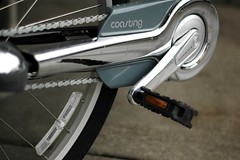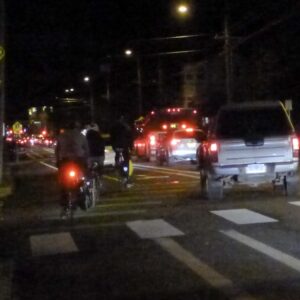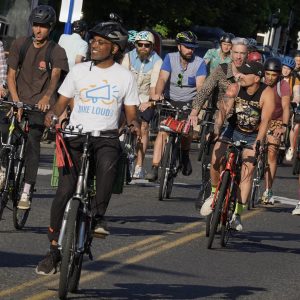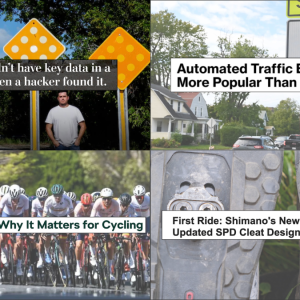At the closing ceremony of the National Bike Summit, the Shimano marketing duo of Shannon Bryant and David Lawrence hit the stage to tell the story of Coasting.
Shimano embarked on this initiative five years ago when they teamed up with premier product design group IDEO. That was the start of on an unprecedented journey to research and then design a product — and marketing campaign — aimed to get America’s 161 million non-cyclists riding again.
[I’ve covered this effort since last May. Browse archived reports and photos.]
Their presentations sparked a flood of questions and led to a vibrant discussion of the role of products, industry, and advocacy in turning more Americans on to cycling.
Lawrence was “embedded” with IDEO for six months to find out how their heralded “human-centered design” philosophy could help Shimano figure out why more Americans aren’t riding. He said,
“We tried to put ourselves in the shoes of non-enthusiasts… to understand their lives and experiences”
He traveled to Phoenix, Palo Alto, Chicago, and Atlanta to do conducts interviews with non-cyclists. In the process, he learned several key lessons about them,
- They share many of the same feelings, and most of them remember the fun they had riding as kids.
- They see cycling only as a sport and competitive activity and have no desire for that sort of experience. They just want to ride.
- They want to escape from their hectic lives and enjoy time with friends.
- They don’t want to learn new technology.
- Bicycling would be just one of many activities they would do with their free time, so they are price sensitive.
- They want to feel safe.
Lawrence and his team took all this information and tried to describe an “ideal experience”. Conclusions reached from these lessons led them to “The Coasting Experience”.
Here is a slide from the presentation that explains more:

After Lawrence’s presentation, Shannon Bryant described her research into the bike buying experience of cycling novices.
She explained that Coasting’s target market not only feel intimidated by bike shops, but that the thought of going to one to buy a bike, “wouldn’t even cross their minds.”

To illustrate this point she asked the crowd if anyone wore sunscreen. Nearly everyone raised their hand. Then she asked how many people bought it from the office of a licensed dermatologist. All the hands went down. How about Walgreens? The hands went back up.
Bryant wanted to compare a dermatologist’s office with a bike shop. You get the point.
Shimano is trying to break down the walls between new (and potential) cyclists and the fun of riding.
To that end, Lawrence says they’re using their website to, “build a community of people who are new to cycling.”

A Q & A session followed the presentation.
I stood up and asked them to explain their views and research on self-sufficiency and maintenance of the bikes by the owner (I know from previous conversations with Bryant that they do not envision Coasting bike riders to do any of their own repairs).
Lawrence said this did come up in their research,
“When we asked people about changing flats and doing repairs they said things like ‘my tool kit will be my cell phone.’ Again, the bike is not the core focus, it’s the experience…and the bike just enhances it.”
We can debate the technical aspects of the Coasting component group (one person I talked to has concerns about the safety of coaster brakes), or the importance of self-reliance (I know some of you feel repairing flats is a rite of passage), but after hearing the presentation today, and seeing the discussion it sparked, I’m supportive of (and excited by) Shimano’s efforts.
They’re approaching the problem (161 million Americans who think bikes aren’t for them) in a new way and their marketing towards newbie and non-cyclists is way ahead of anyone else in the industry.
I also appreciate how Shimano has started a conversation that challenges advocates to go further and reach beyond their base to convince those 161 million non-cycling Americans to get back in the saddle…and that it will take more than just bike lanes to do it.
[Portland’s Bike Gallery just got Trek’s “Lime” Coasting bike in stock last week. I hope to check one out when I get home.]
=====
UPDATE: I took a closer look and did a short test ride of Trek’s Coasting bike. Read the review here.









Thanks for reading.
BikePortland has served this community with independent community journalism since 2005. We rely on subscriptions from readers like you to survive. Your financial support is vital in keeping this valuable resource alive and well.
Please subscribe today to strengthen and expand our work.
The Raleigh bike looks awesome – I’d love to see one up close.
Of course, it’s debatable whether these are technically legal. 😉 I mean, you can’t skid both wheels on clean, dry pavement. And in the words of one PPD officer, “what happens if the chain breaks?”
Ok, sarcastic mode off. I think this is a great idea, and I think some of those “casual” cyclists will learn bike repair skills anyway. It’s a natural progression to want to learn how to fix your vehicle. It doesn’t happen with cars anymore because cars have become so complex that the average Joe can’t do his own repairs. I haven’t seen a bike yet that the average Joe couldn’t learn how to fix.
You can see specs on Raleigh’s cruiser lines here – check out the “Public Utility Bike” aka PUB Cruiser, complete w/ built-in bottle opener and “stout” paint job. At least they asked buyers to ride responsibly 🙂
http://www.raleighusa.com/depts.asp?deptid=8
If people can learn to operate a car, they can learn to operate a simple, conventional bicycle. IMHO, the main obstacle to more widespread acceptance of cycling is the safety issue – most people are terrified of riding in traffic. Advocacy and traffic calming incentives will be much more effective than any technological or marketing sceme.
Why this fixation on making all bicyclists perform their own repairs? I would guess that 98% of auto drivers don’t repair their own cars, and that percentage is still rising. Nobody fixes the flats on their cars. You just swap it for a spare, and take the flat into a shop.
I think it’s fine if this mentality shifts to include bicycles as well. If it makes more fat lazy americans jump on bikes to work off some of those pounds, I’m all for it. Certainly, I’ve heard of initiatives to sell insurance to bicyclists, including (if I remember right) a roadside assistance policy. Maybe this could be more widespread, and offered at point of sale along with these coaster bikes? Make it easy for lazy non-do-it-your-selfers to get back onto bicycles. Let somebody else do everything related to maintaining and fixing the bike for them. Just as long as they actually ride it, that’s great. Awesome, even.
Meanwhile, you and me will continue to fix our own flats, and the world will continue going around, as they say…
I guess if shimano wants to give it a go they can but I am not convinced really. So called “comfort bikes” never really seem to be all that comfortable, more like boats really. If it gets people riding that is great but I don’t think this is going to get people using bikes for transport, if you want to commute gears are good, hand brakes are good, a more agressive riding position helps.
Maybe this type of bike will open peopls minds but it is really mainly old technology made to look pretty and then repackaged and marketed.
Bikes good, more bikes better but I’m still unconvinced. If the 800 pound gorilla wants to try though, they should.
Nobody was ever intimidated about walking into a family-owned Schwinn Dealership. Maybe it is (the stereotype of)the attitude of the bike shop employee.
I am guessing that if it is not simple to remove the back wheel of these Coasting bikes like you would to replace a tube then there would be a substantial labor charge, the kind of labor charge that would make someone park the bike rather than fix it, and walk (or drive) away with a sour taste in their mouth.
Ugh, the marketing “research” bias is very obvious here. I am in favor of anything that gets people on bikes, but equating buying a bike from a bike shop with buying sunscreen from a dermatologist’s office is the stupidest thing I’ve read from a focus group in a while.
If going to a bike shop to buy a bike “wouldn’t even cross the minds” of Coasting’s target group, then what other bike-related idiocy can we expect from these people? Would they really be an asset to the bicycling community?
So this is why Trek found religion . . .
Why this fixation on making all bicyclists perform their own repairs?
Here are some popular reasons.
-Some common repairs, such as fixing a flat, changing out a tube, or replacing brake shoes and cables, are very simple and can be performed with basic hand tools. Some shops (none I’ve been to here, although I haven’t gone around and asked!) charge ridiculous fees for such simple tasks as this. Taking ten to twenty minutes to learn how to do such things (courtesy of knowledgeable friends, books, or even your friendly neighborhood bike shop) ensures that next time you need such a thing done, you have a few extra bucks to spend on other things that matter to you.
-The people who like getting their hands dirty get such a buzz off of doing their own repairs and maintenance tasks that they’re convinced that this is the One True Way and all others should do such as well. The idea that some folks would rather pay a somebody else to do it for them is either offensive or incomprehensible…maybe even both.
-Some folks choose bikes as a means of transport because they seem not only cleaner than cars, but simpler in operation as well as mechanics. Paying somebody else to work out simple tasks equates with being at just one more third-party person’s mercy.
I think some of these reasons are a bit misguided, but the intentions behind them are still good. What’s really necessary is tolerance of people who opt out of learning how with simultaneous tolerance of genuine encouragement. Or, until such a Get-Along-Gangesque utopia comes to fruition:
1)Be-your-own-mechanic types: yes, willful ignorance can be a frustrating thing, but just imagine all the stuff “they” know about that you wouldn’t dream of wanting to know about ever.
2)Get-somebody-elsers: those wild-eyed cranks are slightly impaired by their bias for the smell of bike grease and the satisfying coolness of the surface of a wrench, so cut ’em some slack, they mean well. 🙂
Damn it, I just realized the “why this fixation..?” question was being somewhat answered by Garlynn immediately after the asking. Sorry, Garlynn. Once again I come off looking like a jerk-ass loudmouth. 🙁
Garlynn, something you said keyed something in my head. While I think that simple repairs and maintenance are part of the experience, I am willing to admit that it may be that last little straw that makes someone not want to ride their bikes. Anything to get more people on bikes is a good thing so…
Along the idea of roadside assistance, how about the idea that once a month (you pick a timeframe) someone comes to YOU to perform basic maintenance and check out the bike. Like house calls for Bike Mechanics.
Some serious logistical and economic issues need to be overcome, obviously, but I think in a smaller, bike centric community it would get some traction. Any thoughts?
Andy said:
“If going to a bike shop to buy a bike “wouldn’t even cross the minds” of Coasting’s target group, then what other bike-related idiocy can we expect from these people? Would they really be an asset to the bicycling community?”
Frankly I could care less if they were an “asset” to the bike community. More people on bikes is all that matters…whether they pass a litmus test from “the bike community” or not is totally unimportant to me.
Jonathan,
Is getting more people on bikes really the absolute most important thing, particularly if the ones getting on are mentally challenged?
I can think of all sorts of hysteria that might result after some soccer mom’s demise, resulting in restrictive laws aimed at protecting morons at the expense of the rest of our freedoms.
Like I wrote before, I’m all in favor in getting people on bikes, but I don’t think we are so desperate that we have to cater to the Paris “my cellphone is my repair tool” Hilton segment. When pioneering new territory, I’d rather attract the competent few than the clueless masses.
Andy
Andy: Maybe getting the “clueless masses” on bikes will make them smarter than everybody else. Obviously, it has for you.
“Would they really be an asset to the bicycling community?”
I don’t know, Andy. Given your comments here, I’m not sure that you’re an asset to the bicycling community.
Could it be that elitist attitudes like your own prevent people from getting on bikes?
This project may or may not work but I say that the intent is great- getting more people out enjoying bikes, using less oil, exercising more. You should also know that Ideo is really good at what they do…their methodology is unorthodox but they are very smart, thoughtful people. It would be worth learning a bit more before you start tossing out quick judgements.
OK, I’m in Japan in business now, and let me tell you what I see here: millions of bikes! Everyone has one, and they ride them all over, on sidewalks, on the street, everywhere. They are all riding to get somewhere, not as some kind of leisure activity, not for sport, not for their health. They don’t wear lycra, clipless shoes, rainsuits (even though it rains here a lot! What they do when it rains is hold their umbrellas with one hand and the bar with the other. It actually works!), and they don’t wear helmets for the most part.
The bikes they ride are what we bikeistas would call …um, crap bikes. Chinese made with bad welds and heavy tubes, single speed with coaster brakes, rear-mounted triangle stands, step-through frames, and baskets, baskets everywhere.
I went to a bike shop, and apparently, you can select from fifty or so models of this basic bike for between $100 and $300. In the back, I saw a handful of road bikes and mountain bikes, along with a few fat-tire cruisers. And in this land of Keirin, my question about track-bike frames met with blank looks.
People view bikes as the thing that gets them around when they don’t have a car or a car trip would be impractical (gas is about $5 a gallon, and parking is a real problem). They might be aware of the Tour de France, and track races are a major sport here, but it’s as if they see them as something other than bikes.
It’s this kind of culture we need to develop here, where it’s automatic that you have – and use – a bike. And by “use” I mean “put to a useful purpose.” Encouraging more leisure riders to go out for a spin on the Esplanade on a Sunday – when the weather’s not to hot, not too cold and it’s not raining – is not going to get us there. It might sell a few more bikes, which are going to sit in three-car garages next to the rider mover, jet-ski, and two large SUV’s.
Now, taking Shimano’s technology, you could build the sort of bike that could be used as that universal “useful” bike. I wouldn’t know how to begin the marketing campaign, however, because we need a complete cultural attitude change.
For a long time, the thing that put me off of biking were the bicyclists. They seemed smug, superior, and were generally just arrogant. The bikes are fiddly, too highly engineered, and people took them way to seriously. I went to Japan, where you can get a perfectly functionaly commuter bicycle with a basket and a kickstand for about $60 from a second-hand shop, and came back a bicycle enthusiast.
The coasting group is nice, but certainly too expensive at $500 to achieve widespread adoption. It is a good first start though and the bikes are attractive.
I’ll address this from another angle, one I’m certain a number of shop mechanics would agree with but don’t dare express for fear of somehow biting the hand that feeds them.
The reason that many mechanics dislike dealing with nexus-type hub removal/installation is that, even with practice, it’s a HUGE time-suck. (This is why some shops — including mine — charge considerably more to fix a flat with a nexus-styled hub than with a derailleur hub.)
Owning a bike with this kind of hub may make it easy to ride, but dealing with wheel removal and replacement is about as silly as you can get. The hub-frame interface isn’t always good and sometimes you are literally wrestling the wheel in and out of the frame just to do a simple flat-fix.
If I were a customer with a rear flat on one of these bikes, I wouldn’t want to lift anything heavier than a cell-phone either. I don’t blame them.
In a line of work where the pay is low and the physical and emotional challenges are high, I can tell you that I want the lion’s share of my work each day to feel like I do more than polish turds, even shiny and expensive ones that make a shop lots of money up front.
If I’m going to be paid less for what I do — and I accepted that reality years ago — I’d sure like to think I can find ways to feel inspired and creative about what I do. Some days that is all I get and I revel in it when it happens.
These new “Coaster”-spec’d bikes do not inspire such feelings in me, or in many of my colleagues.
From where I stand — and this may well be the minority view — it feels like just another shiny, expensive, dumbed-down turd, one designed to further promote a social interaction where customers treat mechanics more and more like subservient lackeys and less like the respected, knowledgable professionals I know we are.
If a “Coaster”-spec’d bike rolls into my shop, I will of course repair it, but I won’t celebrate it.
I want to believe that this will get more people on bikes. But certainly not all by itself. We still need to work on making safer streets for bicyclists and pedestrians. This is not ALL of the picture.
So wrench…should bikes be designed for the people who ride them or for the people who repair them?
My car is pretty complicated. I’m sure that if they would just go back to the original VW platform from 1966 that I could probably even repair most of it myself. But that’s not really the point, is it?
Call me stubborn, crazy and an old fart, all of which I am. I think the basic workings of sensible bikes ought to be maintained by the folks who ride ’em. Shop mechanics can handle the bigger stuff: wheelbuilding, frame straightening, complete component upgrades, and such. But let the owner at least learn how to fix his own flats and adjust his own brakes. He’ll be ahead of the game, and a wiser, happier rider to boot.
Not so long ago, home bike repair manuals were the hot seller at most bike shops, and you could find articles on bike maintenance in Popular Mechanics. That approach isn’t front and center anymore, partly because most bike shops are either intent on selling stupid-light race bikes that weren’t designed to last more than a few years; or heavy, point-and-shoot bikes for the cell phone crowd. Neither approach promotes self-sufficiency; and neither approach was designed to.
There was a time when bicycles not only promoted health and vigor, but thriftiness and resourcefulness — and those are traits that are out of place in our current consumerist culture. People who are thrifty and resourceful and who watch what they spend aren’t doing their part to keep the wheel of 24/7 commerce spinning at blinding speed.
The bike industry has little time for these curmudgeons, even though they may hold the keys to success in a future where certain resources become scarce, and a talent for stretching a thing to its utmost usefulness may be a real talent indeed.
But say, just who did they design these bikes for?
Oh, that’s right…the majority of the people they chose to include in their focus groups…the ones that matched their selection criteria and whose feedback resulted in Shimano deciding that the problem to solve was that bicycles are just too complicated and fear bike shops and so on. I really hope this marketing push does manage to get a few more people on bikes, but that doesn’t stop me from feeling a bit cynical about a company spending a lot of time and effort re-engineering the parameters of the *problem* so that they could crank out a new product and hype it as revolutionary. More folks on bikes is great, but this product doesn’t solve the other (and probably more pertinent) things that keep people off bikes, such as safety concerns, misconceptions, aversion to physical exertion, or (gasp!) just plain no damned interest in bikes or biking, period.
I’m spending a couple of weeks in asia and I tried to get a coworker to accompany us on a ride around palau ubin island. He seemed interested at first but then he didn’t come along at the last minute. After a bit of investigation I realized that he was embarrassed to admit that he didn’t know how to ride a bike. It had never occured to me that someone in their 20’s might not have ever learned. It made me wonder how many american adults also just never learned how and are now a bit embarrassed to admit that they need some help to figure it out.
Bjorn
Very interesting observation, Bjorn! This is something that hasn’t really come to mind much for me, which a bit stupid considering that when I started riding to work three years back, I recall *three* people out of the twenty I worked with talking about how “scary” the experience must be for me and ultimately admitting they never learned to ride. It came as a shock but then I didn’t think much of it afterwards, figuring that just like how some people never learn to swim or how to roller skate (I never did).
I wonder if Shimano thought about this in their research push? 🙂 Anyone know of any stats out there on this sort of thing?
NOTHING will get more Americans on bikes until our gasoline prices approach reasonable world levels. Nothing that Trek, Raleigh, or Shimano can do would be half as effective as what the Iraqi insurgency could do!
Jean, please do not bring the Iraqi insurgency into this. There are plenty of initiatives here in Portland that have increased ridership in the past few years, so that proves your statement wrong ipso facto. There are other initiatives that will increase ridership in the future as well.
Peejay and others are right that we need a cultural change, and certainly cost helps drive change, but the negativity is unwarranted given the facts here in PDX.
Bike City is being built one rider at a time.
Shannon from Shimano is a very nice person.
Internal gear hubs (and single speed coaster hubs) are a perfect fit for most utility type bikes, where weight and quickness of repairs are less of an issue that operability and durability.
Most of my bikes have rear internal gear hubs, and yes it is more of a pain to take a rear wheel off than a bike with a derailleur or a single speed cog, but I do it a lot LESS because I get LESS flats, have to fidget LESS with the chain or brakes, etc. The maintenance, rainy weather braking (coaster brake), and clothing benefits of hub gears is a bigger plus than the flat repair issue.
I generally only have to remove a rear tire from my bike when I replace the tire. I do try to minimize flats with the use of thick inner tubes (‘thorn proof’), Slime, and Kevlar protected (Schwalbe Marathon) tires.
The one trick I learned in Asia (or the Netherlands) is to just find the leak and open up the tire casing where the leak is and not remove the inner tube for a patch job.
And throughout communities where utility bikes are in use there tends to be 2 levels of bike shops…the US type shop that repairs and sells bikes and then the smaller shop focusing on flat repair/ basic repair (and rentals/ second hand sales/ accessories).
and yes it is more of a pain to take a rear wheel off than a bike with a derailleur or a single speed cog, but I do it a lot LESS because I get LESS flats,
What’s the basis for this idea of hub-geared bikes resulting in fewer flats than non-hub-geared bikes? The other comparisons make sense, but that one’s new on me. Care to explain?
Maybe that since hub gear bikes are less sporty bikes riders are less inclined to use light tires. I have an old Fisher with a Nexus 7 hub–it will always wear the most bulletproof tires that I can find because the wheel is such a PITA to remove and disconnect.
Ah, okay…not a direct benefit, but strongly influencing a choice that results in less flats. Makes sense. Thanks Jean!
RE: #18, Changing a flat on a Nexus hub equipped bike isn’t a hard thing to do once you have done it a time or two. It’s simple to remove and re-install the shift cable. No self-respecting bike mechanic should complain about the difficulty of this simple task. That aside, the Coasting group looks like a perfect thing for non-bike people who just want to ride a bike without contending with 27 speeds and a bunch of tech stuff. Kudos to the Shimano people for taking another shot at making bikes easier for non-bike people to ride. Given, the Coasting group will likely drift into obscurity like the Specialized Globe series or the Shimano Auto-D 4 speed hub, but it’s the thought that counts.
Cheers, Geoff
Making the bike simple to ride is fine and good, but we also need to make people feel safer on the streets before they’ll ride there. One *cannot* work without the other in this equation; and we cannot leave all the advocacy and law-tweaking to legislators, lobbyists and concerned citizens.
I think it’s important for the bike industry’s big players — the manufacturers who have the money to put behind the energy — to be a significant part of bike advocacy as well as bike cheerleading and sales.
I would be quite interested in hearing about what Shimano and others in the bike manufacturing industry are doing to participate in the ongiong work of advocating for safer streets in our communities.
Great question beth h. I think the bike industry could do more to enhance sales than anything else by lobbying for some simple changes to traffic safety rules.
For Beth and others interested in what Shimano and leading manufacturers are doing toward advocacy, check out http://www.bikesbelong.org.
Take a look at their “advocacy” projects where they fund projects through “grassroots grants” and you’ll get an idea of how much power and influence this organization has. You might also check out who their “board of directors” are.
There’s reason to be wary of the “advocacy” efforts of any industry that measures progress via a bottom line. The types of projects that bikesbelongs.org funds (primarily off-street paths) suggests, like the Coaster bicycle, that they want to build safe places for recreation rather than focusing energy on bicycle transportation issues. That’s my hunch anyway. Check out the website, decide for yourself, and we’ll no doubt open another round of the bike-path vs vehicular cycling debate.
Beth and A_O,
Bikes Belong, the bike industry advocacy group, might be doing more than you’re aware of.
Look at their member list (it includes Shimano).
They are also lead sponsor of the Safe Routes to School National Partnership.
They also have been the lead sponsor of the National Bike Summit for many years.
Last year they launched the Bikes Belong Foundation, a non-profit to focus on bike safety projects and kids bike programs.
They have a community grants program that gave $160,000 to projects in 18 states last year (not much, but it’s something).
They also lobby for bike funding through their BikesPAC political action committee and have a paid lobbyist on Capitol Hill.
Could they do more? Definitely. But they seem to be on the right track.
“Experience” is nothing more than another marketing angle to get people to buy repackaged products. IDEO’s and Shimano’s notion to get people back on bikes is a great one in theory. Unfortunately, it solutions seem to be not much more that re-packaging. What about chains that are not covered in grease and never break, or tires that never go flat? What about helping build more bike paths? If the bike itself is less important than the “experience” why charge $500?
Why am I suddenly reminded of Amsterdam, where 100% of the cyclists ride old-style cruiser typie bikes with only 1 gear and a 50-pound lock?
Convergence of ideas, I suppose…
Some of the comments here are exactly the reason I have not ridden a bike since moving back to the US from Europe a few years ago. It seems that if you want to bike and you, a) don’t have a political agenda or b) don’t want to suit up like Lance Armstrong and prance around the local farmer’s market in $300 custom biking shoes, you are the object or derision and scorn. The “biking community”, as they like to see themselves, have nothing by disdain for the average, older, somewhat out of shape person who just wants to get on a bike and go somewhere. Anyone who is not an “advocate” or who has no interest in becoming somehow obsessed about bikes is simply dismissed. I’m not at all intimidated about going into any bike shop, and have actually recently bought a bike, but I did get pretty tired of being completely ignored by the employees of every shop I went into because I don’t fit their preconceived notion of who has the right to own and discuss their precious bikes. See above comments about “morons”, “soccer moms” and “assets to the community”. Get over yourselves !!!!
You are not very self aware are you Karen?
You are quite busy holding a group of people up for derision and scorn(cyclicts). Your post reeks of arrogance, bitterness and disdain.
Perhaps the employees picked up on your aggrandized sense of entitlement?
That is one big chip you have on your shoulder there. I would think even toddlers would be able to sniff out your attitude! Good luck with all that hostility. Think it might be a tad bit misplaced?
I do!
Karen, you haven’t ridden a bike because of how others perceive you? That’s a weak excuse.
I’ll admit upfront that I despise the Coasting concept, and specifically the name. It will sell bikes, but not the kind of bike anyone actually needs… gimmicky, over-expensive bikes with an ipod flair… sure to be gathering dust in the corner soon.
Talk all you want about the utilitarian bicycles throughout the world – it’s irrelevant in this country. Potential coasting buyers are not looking for something to get them to work, or to the store, or anywhere else they need to go. If they were using a bike in this way they wouldn’t need a gimmick to sell them a bike. The target market is Joe and Sally Suburb. They’ll buy a matching pair and take the kids around the neighborhood once or twice a month. They see bicycles as toys and something like the lime with all it’s “cuteness” does nothing but reinforce that.
I’m yet another American traveling in Asia; in my case, I’m on a six month business trip to India (Hyderabad). Bikes are everywhere, mostly huge, one-speed monsters with coaster brakes.
I went looking for a bike my first weekend here, because I don’t want to drive a car (lots of reasons…) and it will take time to be able to legal ride a motor scooter. What I WANTED was a bike from my youth: a two-speed, pedal-backwards-to-shift, Schwinn with a basket, coaster brake AND front handbrake, big, puncture-resistant tires and a bomber kickstand. Couldn’t find it; the bike shops sell either the one-speed horrors (there are a lot of hills here…) OR 18-speed, high-tech (and high $$$) machines that, yes, intimidate me.
I wound up with a 6-speed (no front shifter) “Hercules MTB” that’s a little too small for me, but basically servicable. The bike shop guys just about went crazy when I insisted on “ruining” it with a basket and bell, but they did it. And it’s working out pretty well. But I REALLY want my old Schwinn…
I *don’t* think that “talk about utilitarian bicycles…is irrelevant in the country.” I’ll be returning to Cambridge, MA from Hyderabad, and from my experience here, I’m going to look for my dream bike when I get home. I think there’s a bigger market for a utilitarian, easy to ride bike than many people believe; this 52-year-old, slightly-overweight guy will buy one…
THE IDEA BEHIND THIS PROJECT IS DUE TO SHIMANOS PROBLEM LATELY WITH A FLAT MARKET AND EXPANDING THEIR BRAND. PEOPLE AREN;T CYCLING AND BY CREATIN A NEW PRODUCT, EXPERIENCE, RETAIL EXPERIENCE AND LIFESTYLE PRODUCT IT EXPANDS THE MARKET FOR NEW INPUT AND USER GROUPS. THE BIG OEM COMPANIES SUCH AS TREK, SCOTT AND GIANT HAVE CREATED BIKES FOR THIS NEW STYLE OF BIKING. ITS NOT ABOUT GETTING AMERICANS ON THEIR BIKES COMMUTING TO WORK AND USING THEM EVERYDAY ITS ABOUT GETTING THEM ON THEIR BIKES DURING LEISURE TIME OVER SITTING INSIDE THEIR HOUSES.
BY CREATING A SIMPLER FORM OF CYCLING THAT FROM AN OUTLOOK DOESN\’T HAVE THE SAME IDEA OF HARSH EXERCISE THATS SEEMS HARD, IT INNOVATES A USER GROUP THAT REFERS TO CYCLING AS COASTING AS THE WORD COASTING BOASTS THE APPEAL OF EASE AND FUN, SOCIAL AND DREAMY.
IN THE END THE INTENSION OF THIS PROJECT ISN\’T TO GET THE WHOLE NATION ON A BIKE BUT OPEN UP NEW POSSIBILITIES AWAY FORM THE CONVENTIONAL \”CYCLING\”